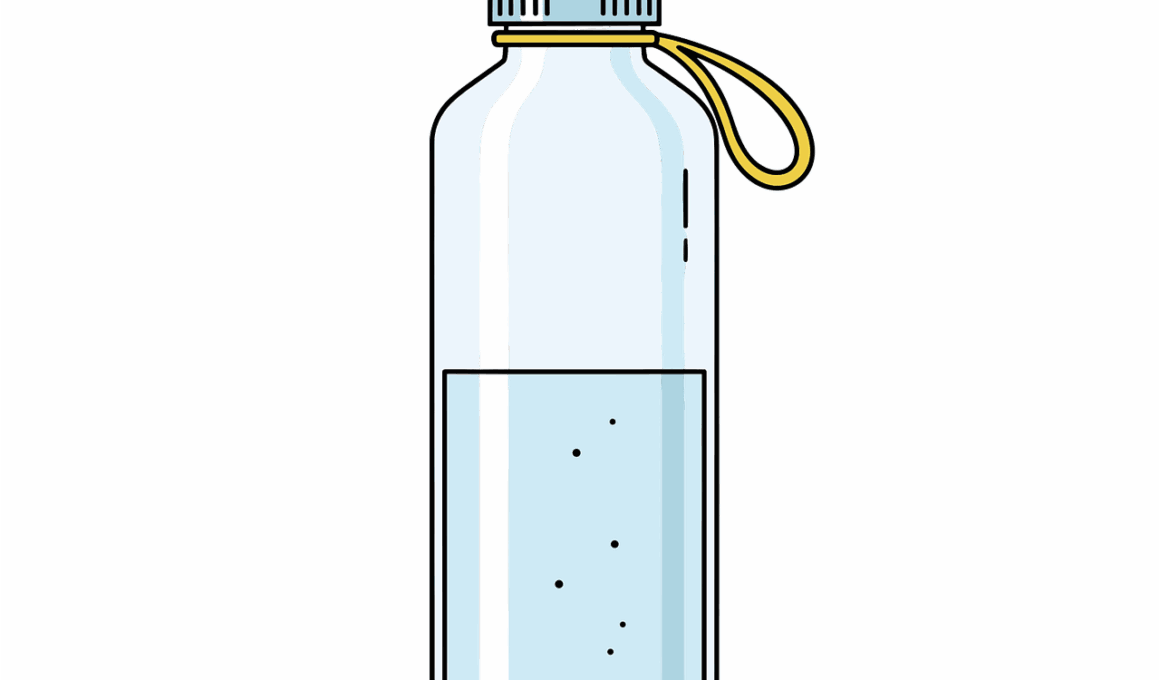Hydration Strategies for Fitness Enthusiasts on the Go
Staying adequately hydrated is crucial for all fitness enthusiasts, especially those constantly on the move. When engaging in physical activities, your body loses substantial fluids through sweating and breathing. To maintain optimal performance, it’s essential to replenish these lost fluids effectively. One method to achieve this is through planning your hydration strategy ahead of time. Carrying a refillable water bottle ensures that you have easy access to fluids. You may also consider incorporating electrolyte-rich drinks to your hydration routine, especially during intense workouts. Consuming fruits and vegetables with high water content, such as cucumbers and watermelon, can further aid in hydration. These snacks provide not only fluids but essential vitamins. Being aware of your body’s signals is key; thirst is often a late indicator of dehydration. Adjusting your intake based on climate and duration of activity is crucial. Lastly, keep in mind that individual hydration needs may vary, so it’s beneficial to monitor your urine color as a guide for hydration status. A pale yellow color generally indicates adequate hydration levels, while a darker shade suggests the need for increased fluid intake.
Pre-Workout Hydration Tips: Ensuring that you’re properly hydrated before beginning your workout is essential for your performance and overall health. Start by drinking water well before your exercise routine, ideally several hours in advance. This practice allows your body to absorb the fluids effectively. A good rule of thumb is to drink about 16-20 ounces of water two to three hours prior to your workout. If you’re exercising in a hot environment, even more hydration before your workout is necessary. Adding electrolytes to your pre-workout drink can be beneficial, especially for high-intensity sessions. Taking the time to consider how much you sweat and adjust your intake accordingly can help optimize your hydration strategy. Remember also to check the foods you consume; certain beverages, like coffee or soda, may have dehydrating effects due to caffeine. Make it a point to incorporate hydrating foods into your meal plan. Foods such as oranges, strawberries, and leafy greens contribute significantly to your overall hydration. Keeping a water bottle handy will serve as a constant reminder to drink regularly.
During-Workout Hydration Techniques
The importance of hydration does not stop once you start exercising. Finding effective strategies for hydrating during workouts can enhance your performance significantly. Depending on the intensity and duration of your exercise, consider consuming small sips of water every 15-20 minutes. This holds particularly true for longer workouts exceeding one hour. If your routine is especially rigorous, incorporate isotonic sports drinks. These beverages replenish electrolytes lost through sweat while providing a quick source of energy. However, be cautious about the sugar content in these drinks; moderation is key. Another option for hydration lies in the use of hydration packs for athletes who prefer to stay hands-free. These packs allow for easy water access and are particularly beneficial during outdoor activities like hiking or running. Additionally, energy gels or chews paired with water can provide both hydration and energy. With all this in mind, assessing your personal preference and workout setting will help refine your hydration approach. No single method works for everyone, so experimentation may be necessary to discover your most effective strategy.
Post-Workout Recovery: After completing your workout, hydrating adequately is essential for recovery and overall well-being. In the first 30 minutes post-workout, aim to drink at least 16 ounces of water to replenish fluids lost during exercise. Your body needs to recover from the exertion, and proper hydration plays a vital role in muscle recovery and reducing soreness. If you engaged in a particularly intense workout, consider including protein shakes or fortified beverages that contain electrolytes as they may expedite recovery. It’s important to include a balance of carbohydrates and proteins in your post-exercise nutrition to aid muscle repair while also providing additional hydration. Use high-water-content foods like smoothies made from fruits to help with rehydration. Moreover, be mindful of your body’s signals, as you may still need fluids several hours after your workout. Continually monitor your urine color to ensure proper hydration levels. This follow-up hydration is often neglected but plays a crucial role in maximizing the benefits of your workout. A well-planned post-exercise hydration routine can make a world of difference.
Hydration on the Travel: Tips for Healthy Hydration Practices
Traveling can often disrupt your regular hydration habits, making it essential to adopt strategies for maintaining hydration on the go. Always carry a refillable water bottle with you and fill it up regularly, especially when you travel by air. Airplane cabins typically dehydrate passengers due to low humidity levels, so drink water before, during, and after your flight. Keep in mind that caffeinated beverages may induce dehydration, so balance indulgence with water intake. When driving long distances, pack snacks rich in water content, such as fresh fruits or vegetables, to maintain hydration. Try to limit dehydrating snacks like chips or crackers. Opt for nutrient-dense alternatives that can provide fluids while also boosting energy. While at your destination, seek out local meals high in water content, such as soups or salads. Utilizing hotel fitness centers can also encourage you to drink more water as you’ll likely be sweating and exerting energy. No matter where your travels take you, focus on keeping hydration a priority to ensure that your fitness goals and health remain intact.
Utilizing Technology for Hydration: Various apps and devices are available to help monitor hydration levels effectively. These tools can remind you to drink water at regular intervals, ensuring you never forget to hydrate, even during busy days. Many smart water bottles also track your water intake, providing feedback on your hydration habits. Personalizing your hydration goals based on your activity level and body type is essential. When selecting an app or device, look for features that meet your specific needs, such as tracking exercise or dietary habits. A hydration calculator can help determine your ideal fluid intake based on factors like weight, age, and activity level. Setting reminders throughout the day will motivate you to stay consistently hydrated. Share your hydration goals with friends or join community challenges to boost accountability and support. By incorporating technology, you can simplify your hydration strategy, making it go hand in hand with your fitness routine. The convenience of these digital tools can transform hydration from a chore into an easy habit.
Final Hydration Thoughts
In conclusion, developing effective hydration strategies is essential for fitness enthusiasts at every level. Consistently monitoring fluid intake and adjusting based on individual needs can help maintain optimal performance and recovery. Whether through planning pre, during, or post-workout hydration strategies, the focus should remain on developing a routine that fits your lifestyle. Remember to incorporate hydrating foods along with beverages to maximize your hydration efforts. Traveling may present additional challenges, yet utilizing practical tips can help ensure that you maintain hydration wherever life takes you. Lastly, embracing technology can enhance your awareness of hydration needs. Staying adequately hydrated supports overall health and fitness goals and can often be the deciding factor in achieving desired results. Make hydration a fundamental part of your fitness plan and remain attentive to your body’s needs. With these strategies in place, you will be well-prepared to take on your fitness journey while feeling your best. Ultimately, investing time and energy in hydration practices will yield lasting benefits for your physical performance.
Moreover, sharing these hydration strategies with fellow fitness enthusiasts can create a community committed to health and wellness, mutually supporting each other. Engaging in conversations about hydration practices encourages accountability and offers new insights. Additionally, participating in group workouts or classes can increase your awareness of hydration habits. As you embark on your fitness journey, prioritize hydration in every aspect, and you’ll positively impact your physical performance and mental resilience. Incorporating hydration practices will transform how you approach your fitness routine and well-being in general.


